How To Be Productive When Working From Home: My "One Task Per Hour" Habit
How can I get tasks accomplished when my fridge is nearby? Working from home taps into the symptoms of ADHD that I have.
I learned early on as an English teacher that grading essays in the 2nd half of the semester required a lot of focus at my kitchen table. Every Saturday in the months of April, May, October and November required at least 4 hours of grading essays. I’ve worked from home in those months since I started teaching community college composition in 2012. Grading essays required intense focus. I must stay objective and give written feedback to each of my students. If I am not fair and precise in how I grade essays, my students will not get what they paid for. This can be difficult when I am at my house.
Being productive at work is easier because I am limited to a number of tasks. I can’t check and see what is in the fridge, I am less likely to surf social media, I can't leave the important task to go hang out with a friend and I can’t clean my kitchen. At work I am limited to working. At work I can see all of my co-workers doing things, so naturally I want to match their productivity. The lack of options increases the chances I will behave like an adult and accomplish tasks that do not offer instant gratification.
The temptation to multi-task always pulled me away from grading essays. To attempt to talk on the phone or even text a friend while I was grading essays would drag my brain’s ability to be productive from giving my students essays my full attention. Even if I was sitting in my office, trying to do 3 tasks at once distracted me from doing the most essential task of grading essays. I believe our brains are designed to do one thing at a time.
My brain has a tendency to want to avoid the difficult, daunting task typically listed #1 on my priority list. If grading essays is the most urgent task to be accomplished(number 1 on the list), I will likely gravitate to knocking out tasks 2 to 7 instead. This is true whether I am at the office or at home. Accomplishing smaller tasks is better than total procrastination, but it does not tackle the most urgent task.
To fight these three productivity problems, I found that forcing myself to do one task per hour helps me to limit my choices for what I can do, eliminate the urge to multi-task and help me to tackle daunting tasks on my to-do list. I call this habit the “One Task Per Hour” habit. If I can focus my mental energy on one task for 60 minutes, I can get quite a bit done. I’ve used this method for over 5 years now.
The "One Task Per Hour" Habit
What you need: A timer, a blank piece of paper, and a willingness to say “not now” to your brain.
Step 1: Find a timer and set it to 60 minutes. I typically use the timer on Google or a kitchen timer. If I am in my office I use the Google Timer by setting it to 60 minutes. For those 60 minutes I can only focus on one task. This past week I had to grade some ENG 112 essays. So I made myself work for 60 minutes at a time on grading essays. 60 minutes is not a long time. It is long enough to where your brain can get focus on one task, but it not too long. This is a kind of first world suffering: if I can make myself do this mentally difficult task for the next hour, then I can do quite a bit.
Step 2: Do not allow yourself to do anything other than the one task. Part of this is to focus fully on one specific task. I am easily distracted by Youtube. So I will not allow myself to watch any Youtube videos during that 60 minutes under any circumstances. It is very easy to check Youtube and then allow myself to watch multiple 5 minute funny videos (which kills 30 minutes). I’m sure you know what I mean. My fingers naturally type in Youtube on the keyboard when I am stressed out, without even realizing it. So I tell myself “OK, after the 60 minutes is up, you can watch a video. You have 35 more minutes left.” After that 60 minutes is up, I will allow myself to watch a video. Sometimes I want to check social media, eat food or check to ESPN.com. The truth is this: Youtube, food, social media and sports websites aid my failure. So I have to block those things out, reject them and focus on my one hard task. Yet to be successful, I need to knock out multiple small tasks and sometimes that task is rejecting the urge to read an article about the Duke Blue Devils on ESPN or watch a funny video on Youtube.
Step 3: Track my work (and lack of work) on a piece of scrap of paper. This is probably the most important part. This is where I track my progress. Get a blank piece of paper and write out what I have done for those 60 minutes. If you accumulate multiple 60 minute increments, you can be more focused than you’d expect. Here are 3 days of work I've tracked recently:
Wednesday, March 18th
Overview of the Day: I was able to work consistently from 10am to about 4pm grading papers and planning for my classes. As you can see I put "Facebook/Emails" and just a "?" Those were times when I got distracted or even got so distracted I didn't even remember what I did. If I track wasted time as, I’m less likely to get off track because I know I have to write it down. There’s nothing wrong with getting off task, but in the back of my mind tracking it helps me stay focused.
Monday, March 30th
Overview of the Day: This is a really perfect day at working from home. I've got to say working at home is hard. But on this day I worked 3 and 1/2 hours straight in the morning. Then I worked nearly 4 straight hours in the afternoon.
Tuesday, March 31st
Overview of the Day: This day is much more distracted than Monday. However, I want to point out that the #1 thing to accomplish on my list on this Tuesday was to "Amend my Syllabi." Because of the coronavirus, I had to switch all of my face to face classes over to online classes. I knew that would be three different syllabi and it could be really complicated. I dreaded that task. As you can see, I took a nap because I did not sleep very well the night before. But when I finally faced that task of changing multiple class schedules, it only took me an hour. I thought it would have taken me 3-4 hours. This task only took an hour, when I was dreading it because I thought it was going to take forever. But the reason I like doing this style of "tracking my tasks" is that I say to myself "Nate, you are going to work on this problem for one hour." This often times proves to me that what I thought would take 2 hours to solve, only took 30 minutes. It pushes me to face hard tasks.
If you are distracted working at home, try this out. I find it very helpful especially since I am working on a laptop which makes it get off task. Whenever I do this, I end up finishing up those dreaded tasks which make it possible for me to finish my work at 4pm rather than 7pm.
This might seem like a strange way to be productive. It may seem simple-minded to some really productive people. It works for me. Yet as more and more people are sitting at computers for more than 7 hours per day, we all must come up with ways to be more focused in a distracted setting.



